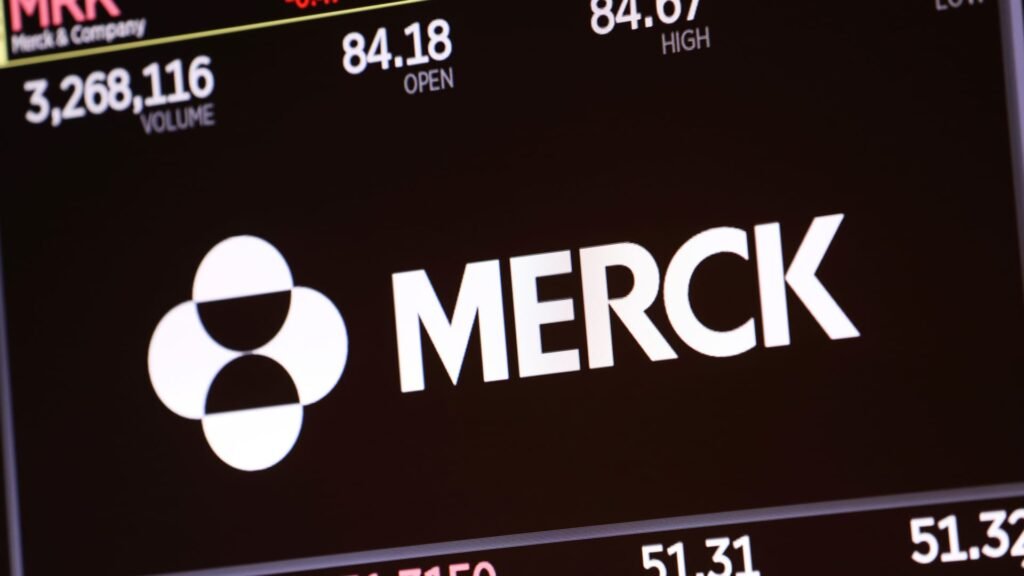Merck & Co. logo is displayed on a screen at the New York Stock Exchange (NYSE) on November 17, 2021 in New York City, USA.
Andrew Kelly Reuter
Merck announced Thursday that its fourth-quarter sales and adjusted profit exceeded expectations on expectations of strong demand for its blockbuster cancer drug Keytruda and HPV vaccine Gardasil.
However, the pharmaceutical giant posted a quarterly net loss, due to an agreement it signed in October with Japanese pharmaceutical company Daiichi Sankyo to co-develop three highly popular cancer drugs. This is due to previously announced charges related to the contract.
The following compares Merck’s fourth-quarter report to Wall Street’s expectations, based on an analyst survey by LSEG, formerly known as Refinitiv.
- Earnings per share: Adjusted 3 cents, expected loss of 11 cents per share
- Revenue: $14.63 billion vs. $14.50 billion expected
Merck shares closed Thursday up nearly 5%.
The company posted a net loss of $1.23 billion, or 48 cents per share, in the quarter. This compares to net income of $3.02 billion, or $1.18 per share, in the same period last year.
Excluding acquisition and restructuring costs, Merck’s fourth-quarter earnings were 3 cents per share. The company’s results include charges of $1.69 per share related to the Daiichi Sankyo transaction.
Merck had revenue of $14.63 billion in the quarter, an increase of 6% from the same period last year.
These results come as Merck & Co. has made significant progress in preparing for Keytruda’s patent expiration in 2028, with several new deals and important new drug launches on the horizon. Losing exclusivity on the drug would likely mean a decline in its sales, forcing the company to derive revenue elsewhere.
“We feel very good” about the progress the company is making in expanding its drug portfolio, Merck CEO Robert Davis said on an earnings call Thursday. But “we need more products,” he said, adding that the company remains interested in making acquisitions and partnership deals.
Merck also provided full-year 2024 guidance, which was generally in line with expectations. The company expects sales of $62.7 billion to $64.2 billion this year and adjusted earnings of $8.44 to $8.59 per share.
Analysts surveyed by LSEG expected Merck’s full-year sales of $63.52 billion and adjusted earnings per share of $8.42.
This adjusted earnings outlook includes a one-time charge of approximately 26 cents per share related to the Merck acquisition. Harpoon TherapeuticsThe company, which develops immune-based anti-cancer drugs, made the announcement earlier this month.
Merck also announced a new restructuring program for 2024 aimed at improving the manufacturing network of both its pharmaceutical division and animal health business. Merck recorded a $190 million charge related to the program in the fourth quarter, which was excluded from adjusted results.
This brings Merck’s total restructuring costs for the period to $401 million. This figure also includes costs from the restructuring program the company launched in 2019.
Pharmaceutical business grows
Merck’s Pharmaceuticals business, which develops a wide range of drugs for several disease areas, posted revenue of $13.14 billion in the quarter. This was an 8% increase compared to the same period last year.
Merck’s immunotherapy Keytruda, which is used to treat several types of cancer, was the main driver of growth.
Sales of the drug were $6.61 billion, an increase of 21% from the same period last year. Analysts had expected Keytruda’s sales to be $6.41 billion, according to FactSet estimates.
Merck Chief Financial Officer Caroline Litchfield said on an earnings call Thursday that the therapy is increasingly used in early-stage cancer and among patients with metastatic disease, or cancer that has spread to different parts of the body. He said the growth was due to strong demand. Merck also saw a surge in sales of Gardasil, a vaccine that prevents cancer caused by HPV, the most common sexually transmitted disease in the United States.
Gardasil sales were $1.87 billion, an increase of 27% from the fourth quarter of 2022. That’s slightly lower than the $1.92 billion expected by analysts, according to FactSet estimates.
Merck’s experimental new coronavirus infection treatment drug “Molnupiravir”
Merck & Co., Ltd. | via Reuters
Meanwhile, sales of the company’s coronavirus treatment Lajebrio fell to $193 million in the same period, a 77% decline from sales of $825 million in the fourth quarter of 2022. Still, sales for the drug exceeded analysts’ expectations of $69 million, according to FactSet. .
That’s no wonder. Demand for Radebrio and other coronavirus products from companies like Pfizer and Moderna plummeted last year as case numbers and concerns about the virus declined from the peak of the pandemic.
Sales of Merck’s type 2 diabetes drug Januvia also fell to $787 million in the quarter, down 14% from a year earlier. The company said sales were weighed down by competition from cheaper generic drugs outside the United States, particularly in Europe, and lower demand in the United States.
That total still exceeds analysts’ expectations of $732.3 million for the same period, according to FactSet.
Januvia is one of 10 drugs eligible for Medicare drug price negotiations, a policy under the Inflation Control Act that aims to make expensive drugs more affordable for seniors. Also on Thursday, Medicare is offering initial pricing for each of these drugs.
Sales at Merck’s animal health division, which develops vaccines and medicines for dogs, cats and cattle, were $1.28 billion, up 4% from a year earlier.
The company said the increase was driven by increased demand for companion animal products such as Bravecto, a flea and tick treatment.
Don’t miss the next story from CNBC PRO.




